Objectives:
To unite young scientists of the Institute for joint activities aimed at the development of scientific activities, professional development and career growth of young scientists and specialists of the Institute.
Objectives:
- Dissemination, promotion and exchange of information on scholarships, grants, funds, support programmes for young scientists and specialists, research seminars, conferences, etc.
- Promoting the latest achievements of science among young scientists.
- Promoting the transfer of knowledge and experience of advanced international and domestic scientists and scientific organizations to young scientists.
- Making proposals to improve the system of incentives for scientific activities of young scientists.
- Arrangement of information exchange of knowledge and experience among young scientists.
- Development and implementation of activities and programs that promote the involvement of young scientists in an active professional and social activities.
- Scientific and practical seminars, youth conferences, sports and other cultural events.
- Assistance in solving professional and social problems of young scientists.
- Assisting the management in organizing and conducting scientific, practical, festive and other cultural events.
FAQ about the Institute of Zoology's Young Scientists' Council
- What are the research areas at the Institute of Zoology?
The Institute of Zoology currently conducts research in the following areas: theriology, ornithology (including bird migration studies), herpetology, entomology, arachnology, malacology, parasitology, paleozoology - How to access full-text journal databases?
The MES provides subscriptions to full-text journal databases to subordinate organizations. Please contact the Academic Secretary for necessary passwords. - Which journals are recommended by COSIN?
From 2021, the requirements for the journals recommended by COSIN have changed, the new list is available on the Committee's website. - Is there a digital library at the Institute of Zoology?
A number of electronic versions of the Institute's publications and staff publications are available on the Institute's website www.zool.kz in the "Publications" section. - Does the Institute of Zoology have a Ph.D. program?
Yes. The MES allocates target seats annually to its subordinate research institutions, including the Institute of Zoology. Doctoral studies are conducted at the universities. - Is it possible to go for an internship in a major foreign centre?
It is possible. Some internships are foreseen in projects, and from 2021 a programme of 500 internships for scientists has been launched, in the framework of which it is possible to improve qualification in the leading scientific centres of the world. - How does research on animals in their habitats take place?
Research is carried out during expeditionary works with high cross-country vehicles and staff accommodation in tents or scientific camping sites. - What new technologies are used in research at the Institute of Zoology?
In recent years, the Institute has used modern technologies such as camera traps, satellite transmitters, geological loggers, GIS and remote sensing technologies. - Is there a trade union in the Institute?
Yes, the Institute has a trade union. - How can I take part in a research project and can a young scientist become a project manager?
Since 2020, the MES announces an annual competition for grant funding, including for young scientists. Scientists who meet the requirements can submit and receive a project. Or a young scientist can be part of a research team. In addition, there are a number of international funds that support biodiversity research, where also a young scientist can act as both project leader and implementer. - Does the Institute of Zoology have a collection or museum?
The Institute of Zoology has one of the biggest collections in Central Asia. There are representatives of various groups of animals, which makes it possible to get an idea of the biodiversity of Kazakhstan and to carry out research in different directions. Until 2010, the Institute of Zoology also included the Museum of Nature, located in the building of Gylym Ordasy, which was later reassigned to this organization. - Are molecular-genetic methods of animal research currently used in Kazakhstan?
Molecular-genetic research methods are widely used in Kazakhstan. The Institute of Zoology has been actively working in this direction for the last decade on some groups of animals together with specialists from Russia, China and the USA. In the near future, it is planned to open a laboratory to carry out such research on the basis of the Institute.
Full list of members of the Young Scientists' Council:
- Alena Kaptyonkina
- Dania Ualieva
- Sanzhar Kantarbayev
- Zaripova Syrymgul
- Nurpeiskyzy Gaisha
- Berdikulov Bekzhan
- Zhantelieva Laura
- Baydavletov Yerlik
- Aleksey Grachev
- Saparbayev Saltore
- Maxim Bespalov
- Sergey Bespalov
- Aubakirova Moldir
- Myrzhieva Asem
- Yuliya Zima
- Fedorenko Vassiliy
- Argynbaeva Yerkezhan
- Nazerke Bijanova
- Barbol Bekzhan
- Madina Salmenova
- Asylbek Ayan
- Kim Leonid
- Lauberts Elza
- Aydin Yeszhanov
- Rakhimov Ruslan
- Egorov Peter
- Aizhan Konysbaeva
- Khamchukova Anna
- Dzhienbekov Aibek
- Abdykerimov Jarylkasyn
- Balataev Aidos
- Kolov Sergey
- Olzhas Karabaev
- Imankulova Raushan



















